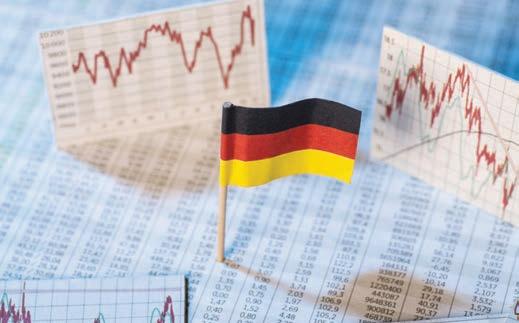
3 minute read
Investment in Africa
GERMANY BOOSTS INVESTMENT IN AFRICAN ENERGY
In an exclusive webinar, “Germany-Africa Economic Relations: Making Deals Post-COVID-19,” panellists sought to mobilise German investment int o the African energy sector, establishing clean energy and digitalisation as two major pillars of economic and investment cooperation.
AFRICA HAS SHIFTED to the forefront of Germany’s foreign policy and development agenda, with programmes rolled out under the country’s US$1.1bn Development Investment Fund for Africa, which is primarily dedicated to easing the entrance of German businesses into African markets. Co-hosting the webinar, the Germany Africa Business Forum is a private think tank whose goal is to strengthen investment ties between Germany and Africa, co-founded by moderator Sebastian Wagner.
A prime example of GermanAfrican cooperation lies in Equatorial Guinea, which employed two German contractors in the construction of West Africa’s first LNG storage and regasification plant located on the country’s mainland.
“The resources are here. We just need to make sure that we have the technology to transfer the goods. In Equatorial Guinea, there is substantial opportunity for synergy between Equatoguinean and German companies. This is not a country that is uncharted territory, or in which the resources are not there. We already produce oil, gas, condensate, methanol and CNG, and are going to start mining. As a result, to enter the market requires technology of transformations,” said Gabriel Mbaga Obiang Lima, Equatorial
Germany is making its mark with smart investment in African energy.
Image Credit: Adobe Stock
Guinea’s Minister of Mines and Hydrocarbons.
The G20 Compact with Africa (CwA) was initiated under the German G20 Presidency to promote private investment in Africa through improvements of the macro, business and financing frameworks. The efficacy of the initiative has been demonstrated in Senegal, which has a long-standing partnership with Germany, mobilising over €1 billion in funding.
“Germany-Senegal cooperation is rich in lessons, in terms of a project approach that is focused on the mode of intervention and implementation through Deutsche Gesellschaft für Internationale Zusammenarbeit and KfW Development Bank, which are focused on technical operation and financial cooperation, respectively,” said Ibrahima Mané, director-general for cooperation and financing, Senegal. “Senegal is working on a new law for public-privatepartnerships. The second phase of the Plan for an Emerging Senegal is focused on private sector development and bringing more clarity and transparency to help investors feel comfortable.”
With a new investment law and a top regional ranking in the World Bank’s Ease of Doing Business Index, Rwanda maintains an attractive investment climate for FDI, in part due to strong public and private collaboration.
“The [Rwanda Development Board] has a responsibility both on the policy side to keep the country reforming and improving, and on the project development side, in the promotion of projects and implementation,” said Tim Gengnagel, deal accelerator for the Rwanda Development Board. “With many German companies, they try to sell products, which is a good first step into a market. However, if you are investing on the continent and in Rwanda, you are not only investing in a consumer market, but also making a regional investment and an export investment.”
“Opportunities are immediately available, in terms of smart grids, automation of metering systems, automation of production lines and adoption of fintech,” said Onyeche Tifase, head of strategy, technology & innovation, oil and gas divison, Siemens Energy. “For German companies that are in the hightech space and have found ways to create a success story in advanced countries, now is the time to transition to Africa. Furthermore, with the African Continental Free Trade Agreement, we are seeing an even greater push toward industrialisation.” “Why would people consider entering the African market? The better question is, ‘Can you afford to ignore Africa?’ The return on foreign investment is the highest in the world, and the continent also carries a significant availability of land for agricultural production,” said Kenneth Reed, managing director for GEA Group, Southern & Eastern Africa.










